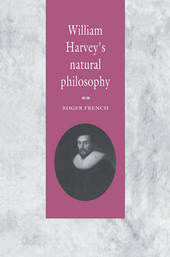
|
William Harvey's Natural Philosophy
Paperback / softback
Main Details
| Title |
William Harvey's Natural Philosophy
|
| Authors and Contributors |
By (author) Roger French
|
| Physical Properties |
| Format:Paperback / softback | | Pages:408 | | Dimensions(mm): Height 233,Width 152 |
|
| ISBN/Barcode |
9780521031080
|
| Classifications | Dewey:611 |
|---|
| Audience | | Professional & Vocational | |
|---|
| Illustrations |
Worked examples or Exercises
|
|
Publishing Details |
| Publisher |
Cambridge University Press
|
| Imprint |
Cambridge University Press
|
| Publication Date |
23 November 2006 |
| Publication Country |
United Kingdom
|
Description
William Harvey's natural philosophy was a view of the world that he had put together during his education in Cambridge and Padua. It contained ways of structuring knowledge, formulating questions and arriving at answers that directed the programme of work in which he discovered the circulation of the blood. This book, the most extensive discussion of Harvey to be published for over twenty-five years, reports extensively on the views of those who wrote for and against him. It is a study of a major change in natural philosophy and of the forces which acted for and, equally important, against change. In a period traditionally central to historians of science, it is argued here that natural philosophy and particularly Harvey's speciality within it - anatomy - was theocentric. Harvey's contribution was experiment; and the revolution which occurred in the seventeenth century was concerned not with science but with experiment and the status of natural knowledge.
Reviews"...a fascinating book." Choice "Roger French gives us a learned, intellectual history of William Harvey's discovery of the circulation of the blood and its eventual acceptance. It can be used as a handy summary of Harvey's ideas and contemporary debates about them, but it also introduces an important argument about the leading place of learned medicine in the development of experimental natural philosophy...French's book ought to be welcomed both for his sound summary of the course of the early modern arguments over the motion of the heart and the circulation of the blood, and for his arguments placing Harvey (and medicine more generally) at the heart of the scientific revolution of early modern Europe." Harold J. Cook, American Historical Review "French's careful analysis of the Demotu cordis itself, separating the discoveries of the 'forceful systole' and of the pulse from the inference to the circulation, seems especially significant for the understanding both of Harvey's discovery itself and of the many misunderstandings that followed." Isis
|